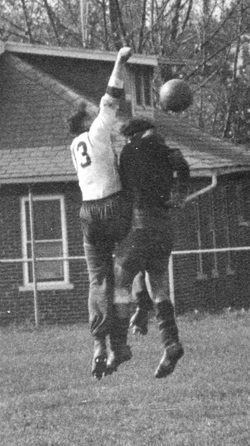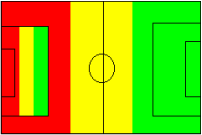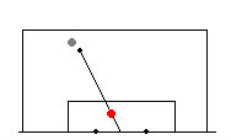- HOME
- MINDSET
- T-SHIRTS
- JUST4KEEPERS GOALKEEPER TRAINING
- UNDERSTANDING GOALKEEPING
- LAWS of SOCCER
- Law 1: The Playing Field (Pitch)
- Law 2: The Ball
- Law 3: The Number of Players
- Law 4: The Player's Equipment
- Law 5: The Referee
- Law 6: Assistant Referee
- Law 7: The Duration of the Match
- Law 8: The Start and Stop of Play
- Law 9: Ball in and out of Play
- Law 10: The Method of Scoring
- Law 11: The Offside
- Law 12: Fouls and Misconduct
- Law 13: Free Kicks
- Law 14: Penalty Kicks
- Law: The Throw In
- Law 16: The Goal Kick
- Law 17: The Corner Kick
- FIFA
- WOMEN'S SOCCER
- 2014 WORLD CUP
- 2010 WORLD CUP FINAL
- LIVE SCORES and LEAGUE STATISTICS
- BLOG
- USING UNDERSTANDING SOCCER
- MLS
- WNSL
- LEAGUE PLAY
- ANATOMY OF A GAME
- SOME BACKGROUND
- OFFENSE
- DEFENSE
- YOUTH SOCCER
- HISTORY OF SOCCER
- GEORGE VECSEY
- REGIONAL & INTERNATIONAL PLAY
- SOCCER TERMINOLOGY
- BOOKS / REFERENCES
- FEEDBACK / QUESTIONS
- SOME PERSPECTIVES
- PHOTO GALLARY
- FORUM
- BREAKAWAY VIDEO
- USA SOCCER
- JEN'S MOTH
Goal Tending

In a recent article, the question "why do soccer goalies wear shorts?" was raised. I have often ask myself the same thing when I watch professional league gamess.
Yes, that's me punching the ball away, but the photo was included to show that I was wearing sweat pants. Every goalie that I played against in high school and college in the 40's and 50's wore long pants. They kept you warm and it cut down on the scrapes and bruises. Lately, I noticed that some professional goalies have started to wear long pants.
The hands are another matter. I did not wear any gloves until late in my senior year. I do not believe that goalie gloves were even available. It was a cold November day and my fingers were numb warming up for the game. When I caught the ball it was same stinging feeling that you get by hitting a baseball with the wrong side of the bat on a cold spring day.
I had a very comfortable pair of gloves that were fine knit over very thin leather. Reluctantly, as I thought that they would be awkward to use, I decided to wear them in the game. Much to my surprise, I was able to grip the ball much better and there was not any pain. Why did it take me over seven years to learn this?
Note: I mention in another section that a goalie should punch the ball away with two hands. Judging from my photo, there are times when one must do.
Yes, that's me punching the ball away, but the photo was included to show that I was wearing sweat pants. Every goalie that I played against in high school and college in the 40's and 50's wore long pants. They kept you warm and it cut down on the scrapes and bruises. Lately, I noticed that some professional goalies have started to wear long pants.
The hands are another matter. I did not wear any gloves until late in my senior year. I do not believe that goalie gloves were even available. It was a cold November day and my fingers were numb warming up for the game. When I caught the ball it was same stinging feeling that you get by hitting a baseball with the wrong side of the bat on a cold spring day.
I had a very comfortable pair of gloves that were fine knit over very thin leather. Reluctantly, as I thought that they would be awkward to use, I decided to wear them in the game. Much to my surprise, I was able to grip the ball much better and there was not any pain. Why did it take me over seven years to learn this?
Note: I mention in another section that a goalie should punch the ball away with two hands. Judging from my photo, there are times when one must do.
Is The Goalie The Most Important Player On The Field?
Yes and No!!!! Since I'm a former goalie and much of the discussion in Understanding Soccer is from a goalie's perspective, I'm being careful not to over state their value.
The goalie is only one of eleven players on a team, who all must complement each other.
A great goalie with a poor team, or a great team with a poor goalie, will probably lose most of the time against stronger competition.
That being said, the goalie is the most important player on the field for several reasons.
THE GOALKEEPING MIND
The following excerpt from The Goalkeeping Mind by Angel Ubide posted on www.insidesoccer.com perfectly captures the essence of goal tending.
The role of the goalkeeper is never well understood – except by other goalkeepers. Goalkeepers are lonely specialists, put in a position that is mostly a setup for failure. They rarely touch the ball, when they do it they have all the spotlight, saves are expected, and mistakes are very costly. It is the mirror image of strikers, who are always involved, mistakes are expected, and their goals – and even their good misses – are always celebrated. No wonder goalkeepers are paid less than strikers, and they very rarely win any awards.
Why therefore would anybody want to be a goalkeeper? Because it is a beautiful place to be. You see the whole game, you command your defence, and you can save your team. You are in charge. But is this something that coaches understand, especially at the youth level?
-----------------------------------------------------------------------------------
Than Finan (Williams College's excellent goalkeeper) comments, was quoted by Dave Fahr in the Berkshire Advocate's The Best Division 3 GK in America:
"Goalkeeper stats are virtually meaningless as they tell you very little of what the keeper accomplished on the field.
A goalkeeper has to make dozens of split-second decisions every game. Do I come out of the crease to cut off a cross before the attacker can get to it? Or, should I hold my line and try to make the save? If I come out, can I get there in time? Finan thinks: "That serve is going toward Sucre. Can I punch it away first? No! Sucre will probably head it to my left so I should slide over there right now" and make the save. Finan, under siege the whole game, had this conversation with himself countless times against Amherst. He almost always makes the correct decision AND IS ALWAYS IN THE RIGHT PLACE!"
------------------------------------------------------
The goalie is only one of eleven players on a team, who all must complement each other.
A great goalie with a poor team, or a great team with a poor goalie, will probably lose most of the time against stronger competition.
That being said, the goalie is the most important player on the field for several reasons.
THE GOALKEEPING MIND
The following excerpt from The Goalkeeping Mind by Angel Ubide posted on www.insidesoccer.com perfectly captures the essence of goal tending.
The role of the goalkeeper is never well understood – except by other goalkeepers. Goalkeepers are lonely specialists, put in a position that is mostly a setup for failure. They rarely touch the ball, when they do it they have all the spotlight, saves are expected, and mistakes are very costly. It is the mirror image of strikers, who are always involved, mistakes are expected, and their goals – and even their good misses – are always celebrated. No wonder goalkeepers are paid less than strikers, and they very rarely win any awards.
Why therefore would anybody want to be a goalkeeper? Because it is a beautiful place to be. You see the whole game, you command your defence, and you can save your team. You are in charge. But is this something that coaches understand, especially at the youth level?
-----------------------------------------------------------------------------------
Than Finan (Williams College's excellent goalkeeper) comments, was quoted by Dave Fahr in the Berkshire Advocate's The Best Division 3 GK in America:
"Goalkeeper stats are virtually meaningless as they tell you very little of what the keeper accomplished on the field.
A goalkeeper has to make dozens of split-second decisions every game. Do I come out of the crease to cut off a cross before the attacker can get to it? Or, should I hold my line and try to make the save? If I come out, can I get there in time? Finan thinks: "That serve is going toward Sucre. Can I punch it away first? No! Sucre will probably head it to my left so I should slide over there right now" and make the save. Finan, under siege the whole game, had this conversation with himself countless times against Amherst. He almost always makes the correct decision AND IS ALWAYS IN THE RIGHT PLACE!"
------------------------------------------------------
The goalie is the last line of defense. Errors made further up the field can be covered by other players. Almost all goalie errors show up on the score board. Sometimes a player can come to the rescue and clear the ball from the goal line. Other times the goalie is just lucky. NE Revolution (MLS) goalie Matt Reis addresses a young goalkeeper's question about getting upset when allowing a goal.
- Goalies direct the defense. They are the only player to have a full view of the entire play in front of them. An excerpt from Ravi Ubha's (London) NY Times article of May 2, 2013 "Surrendering His Front-Row Seat" clearly indicates how important it is that the goalie directs his defense. Goals and saves are always visible, but the constant direction that is required of every goalie is not so obvious..
Left arm outstretched and gloved index finger pointed, he continually warned Villa’s back line of potential danger. He shouted encouragement to one of his central defenders, told his right back where to position himself and applauded when pressure from his left back prompted an Arsenal cross to sail harmlessly over the crossbar.
And that was just in the game’s first three minutes.
------------------------------------------------------------------
Most people new to soccer do not realize that the goalie often initiates scoring drives.
- The goalie is also a field general who directs the players in front of him. They are the only player who has the entire field (pitch) in full view. He/she is continually communicating with the defenders and often directs an attack. It is important that the goalie clearly signals his/her intent on a play and as early as possible. A goalie will shout out:
- "Keeper" ,or another code word, when he is making the play on the ball.
- "Away" when he/she is NOT going to make the play. This is critical on crosses and corner kicks.
Goalies usually play at least a yard or two off their line off their line. They will move even further out as play dictates. It is essential that the goalie masters how to play the angles, thus minimizing the area in the goal available to score.
The goalie must read the opposing play and quickly determine how to be positioned. This is very important on breakaways. The distance to the attacker, the speed of the attacking player, the distance the ball is from the attacker and the identity of the attacker all must evaluated in an instant, thus determining the goalies action. The goalie must also be aware if another offensive player is in position to receive a pass if he challenges the breakaway.
Coaching of Goalies: Very few coaches are versed in soccer goalkeeping techniques and tactics are often a mystery. This is especially true at younger age levels, where often coaches have not played much soccer, much less played goalie. Also, experienced field players and coaches may not have much experience with goalkeeping.
Goalkeeping Drills: There are many resources that available for goalies to learn the necessary skills, including DVD's and soccer web sites that provides training videos. The skill set being taught may vary, but they all emphasize the development of quick reflexes which can only come from practice.
NSCAA's Goalkeeping Academy's three DVD set "Soccer Goalkeeping Training" is excellent.
Diving: Good positioning is supposed to minimize diving, which is when the goalie leaves his feet and goes to ground. They are instructed to stay on their feet as long as possible. Once on the ground they cannot react to the play or loose balls as readily.
Good goalies are pro active and they "Never Give Up!
Good goalies are pro active and they "Never Give Up!
High Balls:
Goalies Positioning Zones

The color coded field (pitch) has two tri-colored areas, one for the entire field and one within the penalty box (the eighteen). Goalies usually position themselves in the penalty box in relation to where play is. It is not unusual for goalies to play as far out as the area between the penalty box on mid-field. They then retreat into the area of the eighteen that corresponds to the zone in the field (pitch). Goalies will be within the red goal area when play is in the red third of the field (pitch).
Goalkeeper's Positioning

Cutting the Angle: The cardinal rule for cutting the angle is for the goalie to be positioned in a direct line with the ball and the attacking player. This holds true regardless of the attackers position relative to the goal.
Breakaways: A breakaway is when an attacker is advancing unmarked (alone) towards the goal thereby forcing the goalie to move off his line to break up the play. In addition to cutting down the angle in order to minimize the chance of being scored upon, he must also quickly judge the attackers rate of approach and distance from the goal. Leaving too soon usually allows the attacker to move past or play the ball over the goalie into the goal. If he waits too long, the attacker will be in closer and have more open net to shot at.
US 2-Honduras 3 Winning Goal: Did Tim Howard come out too late and go too far???
-------------------------------------------------------------------------------------------------------------------------
Penalty Kicks:
Goalkeeper must be on the end line. Cannot move until the ball is kicked.
Cheating helps.
Make a quick and short jump forward (illegal).
Attempt to distract the shooter.
Sets body in motion.
Tricks, etc.
Pointing to one side of the goal.
Taking a piece of paper out of sock and reading it before the shot. Some goalies keep statistics on the shooters of the opposing team.
A physiological game. Pressure is on the shooter as he is expected to score.
Penalty Kick Statistics:
FA Premier League 2008 statistics show that 30% of 78 PK’s were missed.
German Bundesligia—A 16 year study of league games showed that 24% of penalty kicks were missed. 99% of shots in the higher half of the goal went in. It is more difficult for goalies to reach shots into the upper corners than ones lower to the ground.
Helmuth Duckadam (Steaua Bucharest) saved a record 4 consecutive penalties in the1986 European Cup Final against FC Barcelona.
Portugal national team goalkeeper, Richardo, saved 3 penalties against England in 2006 World Cup.
Penalty Kicks:
Goalkeeper must be on the end line. Cannot move until the ball is kicked.
Cheating helps.
Make a quick and short jump forward (illegal).
Attempt to distract the shooter.
Sets body in motion.
Tricks, etc.
Pointing to one side of the goal.
Taking a piece of paper out of sock and reading it before the shot. Some goalies keep statistics on the shooters of the opposing team.
A physiological game. Pressure is on the shooter as he is expected to score.
Penalty Kick Statistics:
FA Premier League 2008 statistics show that 30% of 78 PK’s were missed.
German Bundesligia—A 16 year study of league games showed that 24% of penalty kicks were missed. 99% of shots in the higher half of the goal went in. It is more difficult for goalies to reach shots into the upper corners than ones lower to the ground.
Helmuth Duckadam (Steaua Bucharest) saved a record 4 consecutive penalties in the1986 European Cup Final against FC Barcelona.
Portugal national team goalkeeper, Richardo, saved 3 penalties against England in 2006 World Cup.